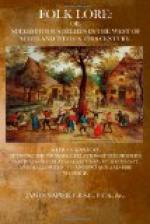houses as a sort of friend, and information of his
presence in the village was quickly conveyed to the
neighbours, so that he generally had a large gathering
of women who were all friendly to him, and he was
never allowed to go away without reward. When
any stranger was present he would point them out,
and write down the initials of their name, and sometimes
their names in full, without being asked. He
would also, at times, write down the names of relatives
of those present who lived at a distance, and tell
them when they would receive letters from them, and
whether these letters would contain good or bad news.
He disclosed the whereabouts of sailor lads and absent
lovers, detected thefts, foretold deaths and marriages,
and the names of the parties on both sides who were
to be married. He wrote of a young woman, a stranger
in the village, but who was present on one of his
visits, and was on the eve of being married to a tradesman,
that she would not be married to him, but would marry
one who would keep her counting money; which came
to pass. The tradesman and she fell out, and
afterwards she married a haberdasher, and for a long
time was in the shop as cashier. This woman still
lives, and firmly believes in the prophetic gift of
dummy. Another woman, a stranger also,
asked him some questions relative to herself; he shook
his head, and for a long time refused to answer, desiring
her not to insist. This made her the more anxious,
and at last he drew upon the slate the figure of a
coffin. This was all the length he would go.
In less than twelve months the woman was in her grave.
During one of his visits the husband of one of the
women who attended him was seriously ill, and the wife,
a stout healthy woman, was anxious to hear from dummy
the result of her husband’s illness. He
wrote that the husband would recover, and that she
would die before him; and she did die not long after.
In short, this dummy was a regular prophet,
and his predictions were implicitly believed by all
who attended upon him. In his case there was no
pretension to visions, the form which he allowed his
gift to assume was that of intuition. Some few
men in the village suspected the dummy’s
honesty, and thought that he heard and assiduously
and cunningly picked up knowledge of the parties;
but such doubts were regarded as bordering upon blasphemy
by the believers in dummy. I was never
present at any of these gatherings, but my information
is gathered from those who were present. Some
months ago I was talking to an ordinarily intelligent
person on this subject, and he gave it as his opinion
that dumb persons had their loss of the faculties
of hearing and speech recompensed to them in the gift
of supernatural knowledge, and he related how a certain
widow lady of his acquaintance had been informed of
the death of her son. This son was abroad, and
she had with her in the house a mute, who one day
made signs to her that she would never see her son
again, and a few weeks after she received word of
his death.




